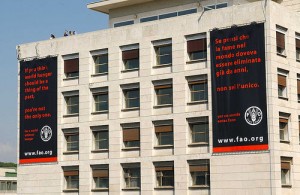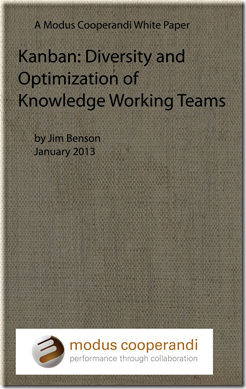Deb is a Modus client with a high-demand job. She handles all of the requests for information, content, or support for the Lean Enterprise Institute in Cambridge, Mass. Every day, she receives calls from people who almost know what the want, she guides them to what they need. Each call is an opportunity to further LEI's mission, to help someone in need, and to improve her processes. Deb is thoughtful about her work and working with her has been a learning experience for us as well. In this video, she talks about using Personal Kanban for client management, the vulnerability of transparency, and using visual systems in the office to raise awareness and communication. This is truly a 15 minute masterclass on how to do it right.
Positional Power and Unintended Influence
It's tough to handle this fortune and fame Everybody's so different, I haven't changed ~ Joe Walsh
It was spring. That winter, like this last one, had been harsh. Internally, my client was trying to lead his company to change...to a better tomorrow. He had been working to give his people more autonomy, more agency, and more internal influence. He kept waiting for that cultural winter to abate, for people to thaw out and enjoy working…but it, like winter, happened on a schedule he couldn’t control.
“I don’t know what I’m doing wrong,” he sighed as we ate lunch. “I keep asking people to take responsibility from me. I’m building structures to let them make their own decisions. I am giving people autonomy. But when I get into a meeting with them, they still defer to me. If I offer a suggestion, it becomes a marching order. It’s just a suggestion!”
Recently, another client of mine had a project that gained a rare visit from the CEO. He came and spoke with the team and they had a good time. When he left, the team was energized and excited to keep working. The CEO was excited too.
The CEO was so excited that he couldn’t stop thinking about the project. So, on the plane ride home, he sent them an email saying how excited he was and giving them some thoughts he had about what was going on.
Instantly, people sprung into action - making the thoughts of the CEO the primary focus of the team. The team was excited to please the CEO, but were also a little annoyed. They already had enough work on a complicated project and now they suddenly had to respond to all these new demands. This made people a little uneasy, they were happy to help on the one hand, but annoyed on the other.
Then my client had the wherewithal to actually write the CEO back!
She asked a simple question: “Those things in your e-mail, did you intend for us to consider them or act on them immediately?”
The CEO wrote back, as you might expect, “They were just thoughts, I was excited about the product and our meeting. You guys build what makes sense.”
No one was born a leader. No one was born a manager. We’re all just people.
One of the hardest things for a CEO to accept is that our positional power extends well beyond simply giving orders or being able to fire people or controlling the purse strings.
When we are in management, our words become law much faster than we realize - and this is very hard for us to counteract. Those who are “under” us have to discern when we are having an idle thought and when we are issuing an order. They will usually err on the side of “issuing an order”.
When we have positional power, that power manifests itself as influence. Influence may be something we can wield, but it’s energy. It discharges on its own quite frequently.
Simply being in a meeting can and will alter the ideas expressed and acted upon. Simply writing an excited email, where you are honestly enthusiastic, can have negative repercussions.
One problem I’ve run into many times is that in leadership one of your main jobs is to be constantly identifying options for the future of your organization. You must constantly be devoting time to investigating new markets, products, structures, business models, partnerships, and so forth. Discussing this with “staff” can create confusion, they don’t know if your new thought is some flighty “Hey let’s derail everything and do this!” or just an idle thought or something to be lightly investigated or maybe even just something to ponder.
They are looking to you for actionable advice. They want your words to compel action. That’s all well and good, but enlightened leaders and managers know that they cannot compel all the action, that healthy companies have ideas coming from all directions, and that sometimes a leader needs to just talk.
There is no solution at the end of this blog post other than a call for awareness. As leaders, look to set up intentional structures that let you participate in as much of a peer-to-peer role as possible, but be aware that you cannot ever fully be a peer due to your positional power. Don’t shy away from this. Just understand that that the dynamic is real and impacts your company greatly.
Modus Cooperandi White Paper: Kanban: Diversity and Optimization of Knowledge Working Teams
Announcing the publication of Kanban: Diversity and Optimization of Knowledge Working Teams – a new Modus Cooperandi White Paper.
Late in 2012, we conducted a Board Walk (a site visit where we meet with teams using kanban or Personal Kanban and help them optimize the board and the team itself) at a client in the United States. There were 15 individual teams, each of which had its own individually designed boards. Each board had a unique value stream, work item types, policies, and methods for judging completeness and quality.
Both management and the teams were frustrated because they hadn’t yet found a board design that worked for the entire company. They were looking for standardization.
However, each of these boards were, in some way, optimized for each individual team. Each team had its own context and these boards related specifically to that context. Each team was also actively improving their boards on a regular basis – meaning that optimization was continuing.
This white paper contrasts many of these boards, showing the differences in design of each board and the ramifications of those variations.
A PDF of this is available for organizations requiring a bulk purchase. Please write.
Personal Kanban by Jim Benson and Tonianne DeMaria Barry
Working with the United Nations
Over the last six months, Modus Cooperandi has had the good fortune to participate in three United Nations projects. The UN's missions lend themselves well not only to collaborative management, but to lean and social media, too. While the UN will be quick to admit they aren't early adopters of the last two methods, they are nevertheless appreciative of the power of lean and social media, and are ready to begin implementing them in earnest. It's been exciting and rewarding to watch, and we feel privileged to be a part of this work. Our three projects so far have been:
Collaboration eLearning Packages
UN Food and Agricultural Organization - Rome, Italy
Modus Cooperandi worked with a team of 20+ authors, editors, and eLearning specialists to build a comprehensive set of lessons around collaboration, community, and team building. Jim and Tonianne helped devise a group writing system using a variety of online tools to facilitate communication and collaboration. Additionally, we were principle authors on three sections of the eLearning package itself. Once complete, the system will be translated into six languages, and made available to UN staff and those interested worldwide.
OzonAction's 2010 Social Media Plan
United Nations Environmental Programme, OzonAction Unit - Paris, France
OzonAction is the UNEP's group which, with the ambitious goal date of 2010, helped phase out the manufacturing of ozone depleting substances (ODS) such as chlorofluorocarbons (CFCs). Now, in its second phase, two additional ozone-depleting chemicals are on the chopping block: hydrofluorocarbons (HFCs) and MethylBromide. While OzonAction could certainly use their existing and successful methods to meet their deadline for the removal of these two compounds, they've chosen to incorporate social media to eradicate them ahead of schedule. Their success in the past has not made them complacent, and Modus Cooperandi is helping to create a social media plan that will provide the organization with actionable steps that won't overtax their budget or their staff. The goal here is to provide the maximum benefit for OzonAction without getting caught up in the fads or hype of the social media movement. OzonAction's goals are serious, and so their use of social media should be directed in a way to reflect that sense of gravitas.
2010 Human Development Report for Vietnam
United Nations Development Programme - Hanoi, Vietnam
Over the past two decades, with the rise of globalization, Vietnam has experienced unprecedented economic growth. With one of the fastest-growing economies in the world, Vietnam has graduated to a mid-tier economic power. For this nation in transition, the current global economic downturn has left Vietnam with both options and opportunities. Countries in the United Nations need to provide a Human Development Report (HDR) to guide policy and funding both internally and externally. In many cases, the HDR can be several years between issues, and Vietnam is no different. For this project, UNDP and the Vietnam Academy of Social Sciences (VASS) have gathered researchers and scientists from several different agencies within and outside Vietnam to create the HDR. The goal of this project is to have a full-fledge HDR, with detailed and directed recommendations, ready for the Vietnamese General Congress in October. Modus Cooperandi is facilitating this effort by implementing a collaborative management system, coaching researchers on collaboration as the document is authored. Rather than merely having a document constructed of distinct sections authored by independent researchers, the goal here is to bring all the researchers together and inform the sections with one voice, and in real-time. This should result in an end-product that makes consistent points throughout, as opposed to individual points in each section. Recommendations will then be bolstered by coherent arguments threaded throughout the entire document.
Collaborating with the United Nation's Food and Agriculture Organization (FAO)
 Modus Cooperandi has begun a project to help the UN's Food and Agriculture Organization (FAO) create on-line training courses in distributed collaboration. Modus joins thought leaders and experts from around the world in building a curriculum that will help workers from FAO and other organizations collaborate from a distance. The project's aim is to provide knowledge of patterns, practices and tools that facilitate distributed collaboration and knowledge sharing - making remote locations no longer isolated , and providing expertise more quickly and at much lower cost. The resulting materials will be made available in seven languages and is scheduled for public use by the Summer of 2010.
Modus Cooperandi has begun a project to help the UN's Food and Agriculture Organization (FAO) create on-line training courses in distributed collaboration. Modus joins thought leaders and experts from around the world in building a curriculum that will help workers from FAO and other organizations collaborate from a distance. The project's aim is to provide knowledge of patterns, practices and tools that facilitate distributed collaboration and knowledge sharing - making remote locations no longer isolated , and providing expertise more quickly and at much lower cost. The resulting materials will be made available in seven languages and is scheduled for public use by the Summer of 2010.
InfoPak 2 - Personal Kanban 101: How to Build Your First Personal Kanban
Modus Cooperandi is pleased to announce the release of its second Personal Kanban InfoPak. In Personal Kanban 101: Achieving Focus & Clarity with Your First Personal Kanban we discuss the essentials for getting your board started. Topics addressed include how to establish value stream, backlog and WIP, and why there are only two hard rules to implementing this productivity tool.
As always, please feel free to download, distribute, comment and let us know what you think.
Personal Kanban at the World Bank: Modus Cooperandi Info Pak 1 Released
This is the first in a series of Modus Cooperandi's InfoPaks. They are downloadable, and work like a narrative whitepaper. Think of them like graphic novels for business.
In InfoPak One: Personal Kanban at the World Bank, we discuss the experience we had leading a rapid development project at the World Bank, specifically, how visual controls work with small groups, and why they are preferable to traditional team management.
This InfoPak is best read by clicking the “Full” button above. It’s also designed to be downloaded to distribute to others. Over the next few weeks, we will post more InfoPaks on Personal Kanban. Please feel free to comment and let us know what you think.
Personal Kanban and the World Bank
 Modus Cooperandi is excited to announce our upcoming personal kanban project, where we will use our Personal Kanban techniques in a directed exercise with knowledge workers from around the world. From the 21st through the 25th of September, Jim Benson and Tonianne DeMaria Barry will be working with The World Agroforestry Centre and the World Bank to lead their Capacity Building Program on the Opportunity Costs of Reducing Emissions from Deforestation and Land Use Change (OpCost) Writeshop, at the World Bank Institute in Washington D.C. The intent of this directed exercise is to create a comprehensive technical document. As small working groups and as a unified team, participants will use personal kanban to maintain project coherence and track completion. The project is expected to achieve rapid release of a highly technical product by knowledge workers from around the world. The multi-lingual, multi-disciplinary group will benefit from personal kanban's visual controls and work flow.
Modus Cooperandi is excited to announce our upcoming personal kanban project, where we will use our Personal Kanban techniques in a directed exercise with knowledge workers from around the world. From the 21st through the 25th of September, Jim Benson and Tonianne DeMaria Barry will be working with The World Agroforestry Centre and the World Bank to lead their Capacity Building Program on the Opportunity Costs of Reducing Emissions from Deforestation and Land Use Change (OpCost) Writeshop, at the World Bank Institute in Washington D.C. The intent of this directed exercise is to create a comprehensive technical document. As small working groups and as a unified team, participants will use personal kanban to maintain project coherence and track completion. The project is expected to achieve rapid release of a highly technical product by knowledge workers from around the world. The multi-lingual, multi-disciplinary group will benefit from personal kanban's visual controls and work flow.
We will be blogging and tweeting about the event as it unfolds.
Photo: Brixton
Jim Benson to Teach Enterprise 2.0 in Zurich - Nov 2, 2009
 On the 2nd of November, 2009, Jim Benson will be teaching Enterprise 2.0 as part of Somesso's Leveraging Corporate Social Media in the Finance Sector event in Zurich, Switzerland. The Enterprise 2.0 track is part of our on-going strategic partnership with Dion Hinchcliffe and Web 2.0 University. Using Dion's courseware, Jim will be teaming with a German counterpart to tailor the materials to the European financial community.
On the 2nd of November, 2009, Jim Benson will be teaching Enterprise 2.0 as part of Somesso's Leveraging Corporate Social Media in the Finance Sector event in Zurich, Switzerland. The Enterprise 2.0 track is part of our on-going strategic partnership with Dion Hinchcliffe and Web 2.0 University. Using Dion's courseware, Jim will be teaming with a German counterpart to tailor the materials to the European financial community.
Photo: BeatKüng
Sente and Gote in Personal Kanban
Sometimes your relationship to work is initiative based, other times it is reactive. This is simply the nature of work. It is normal, and nothing - not personal kanban, not GTD - is going to change that.
In the game “Go” (“Weiqi” in Chinese) there are balanced strategic concepts for the natural ebbs and flows of taking the initiative or reacting to a change in a situation. “Sente” is the term for the initiative, “Gote” is the term for being reactive.
In English, we’d be tempted to equate these to Offense and Defense. However, there’s a subtle difference here. The word “defense” has a few connotations we’d like to avoid when working. One is that you are on the defensive when you’ve lost control of something. The other is that the goal of your defensive strategy is to quickly regain an offensive strategy.
This comes from the animal brain inside us all. Reaction is the gazelle taking flight when the cheetah springs forth. Reaction, for human beings, naturally caries a fight or flight response.
In Go, Sente and Gote positions are perfectly acceptable at all times. There are Go Masters who can win a game and play almost entirely from a Gote position. The Sensei knows that reaction is itself an action.
Why is this important?
Life comes at you fast. The nature of personal work is that some days are quiet, comfortable, and predictable. They are yard work or cleaning the house. Systematic and reassuring. Other days your water heater explodes and covers your basement in water, steam and destruction.
Some days you are at work, methodically finishing up your report and other days you are surprised to get a report back with particularly nasty comments and an unrealistic deadline to fix it.
On days like this we realize that life doesn’t always respect our personal goals. Mopping up water and pulling down saturated wall board isn’t helping us achieve our goal of learning Spanish. This makes us feel like we are on the English term defensive, and that upsets us. We wanted to learn Spanish by Tuesday and now we have to wait.
Well, this is why most businesses fail. It’s why bosses are cranky. It’s why people don’t feel they get what they want from consultants. It’s why that damn plumber is STILL HERE installing the dishwasher.
Life is, by its very nature, chaotic. We’re lucky that it is predictably so, but it still does not adhere to our plans. Whether you are doing Sente or Gote work, the work needs to be done. The best way to assure rapid and effective completion is to look past the emotions of “defensive” and accept Gote into the attainment of your goals.
What kanban seeks to do is visualize how your work is actually done. It actually accounts for exploding water heaters and other unexpected events because, over time, your throughput will reflect these.
So, say you have 20 projects at home and they have an average cycle time of 4 weeks from conception to completion. The mean time to completion though, might only be 2 weeks. There were a few outliers in there that took 6 or 8 due to unforseen events.
What you know from this is that you have a maximum of 8 weeks to complete a household project, it’ll usually be done around 2 and that 6 is a very safe number to promise completion by, with 8 being virtually guaranteed. As you notice this, you can start to examine why those 8s are happening.
I’d be willing to bet those 8s are projects that developed a defensive posture and were delayed due to emotional reasons. In short, they were shelved because they became too hard to finish. Well, those unfinished projects mount up and procrastination has a price. You now have a 2 to 8 week variance in the time it takes you to finish something around the house.
So we can examine those projects. Are the 8 week ones just more complex? Do they involving cleaning? Yard work? Being outside when the chatty neighbor might want to chew your ear off? Are they perhaps even unimportant?
When you find the commonalities in the outliers, you can then develop Gote strategies. As I said, Go Masters are unphased by adopting a Gote posture because there are deep and tested strategies for achieving victory from Gote maneuvers. Part of this is tactical series of moves that undo an offensive maneuver by your opponent, but the other part is mental. Reaction to events whether on the Go board or in life in general is natural. Acceptance of this natural relationship calms the fight / flight response in our animal brains and allows us to quickly and effectively deal with the unexpected work. This reduces the time to completion, shrinks our cycle time, and eliminates outliers.
Be calm, deal with the issues, reduce variance.



